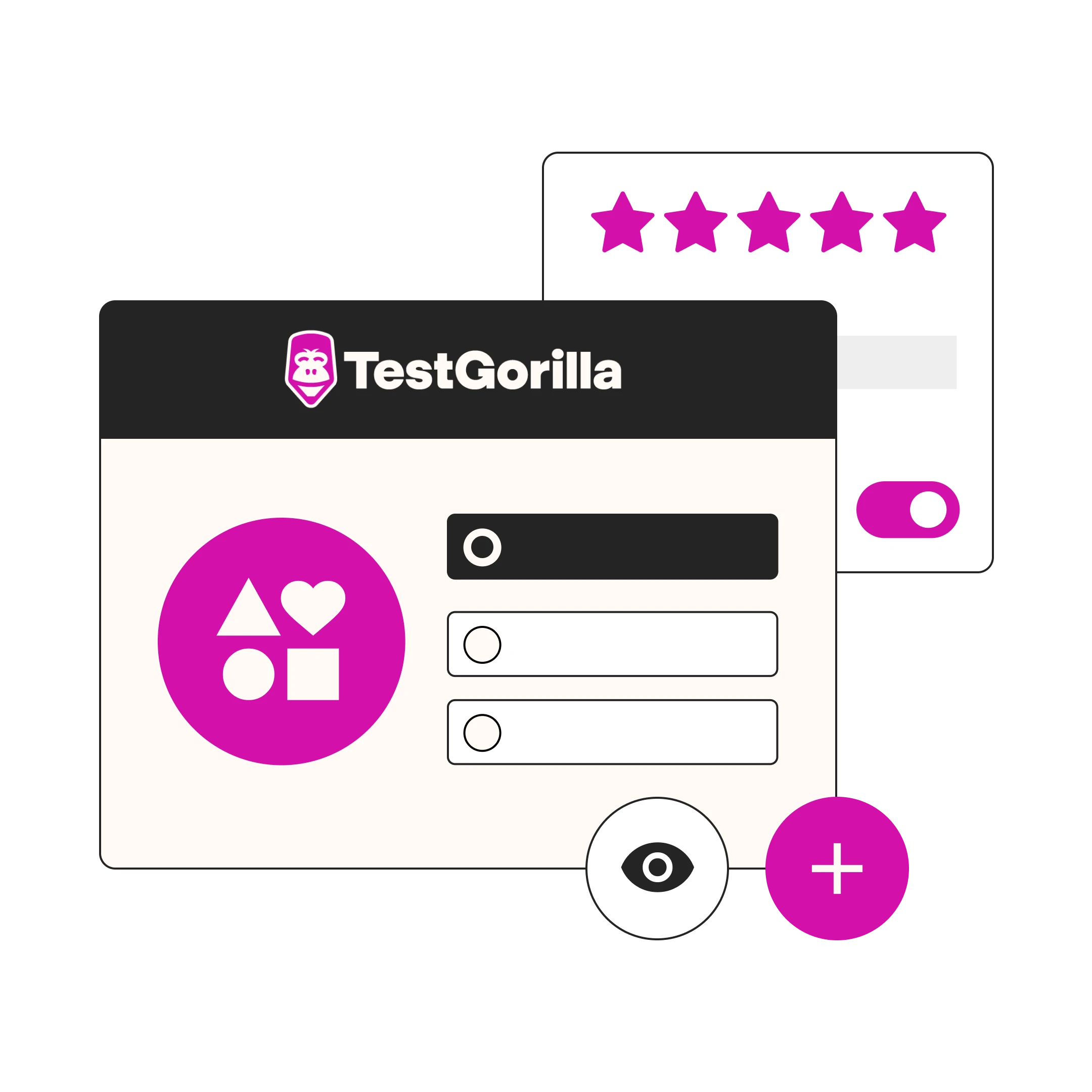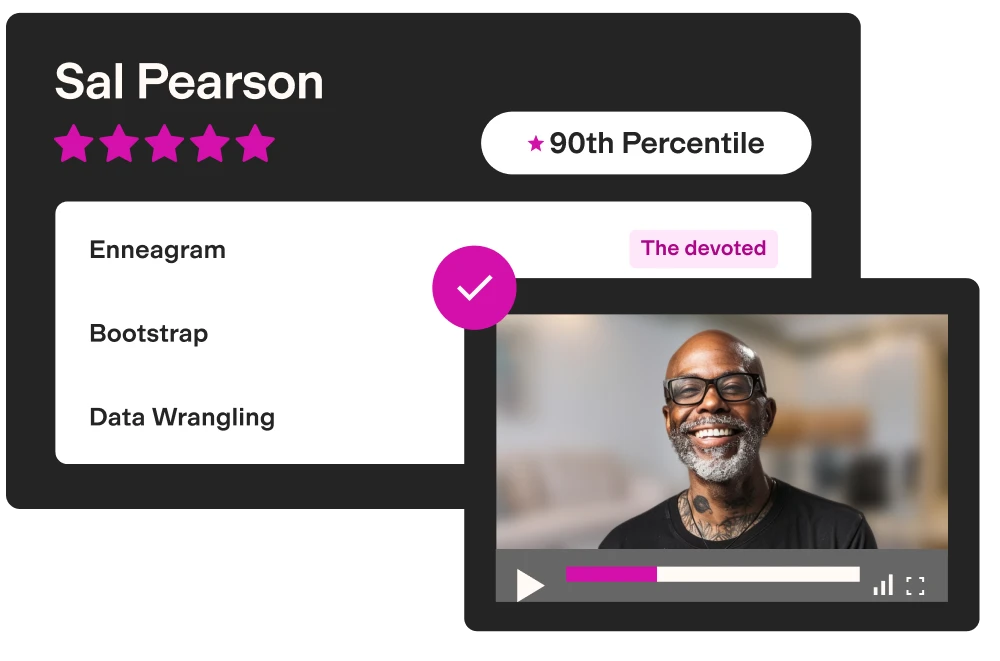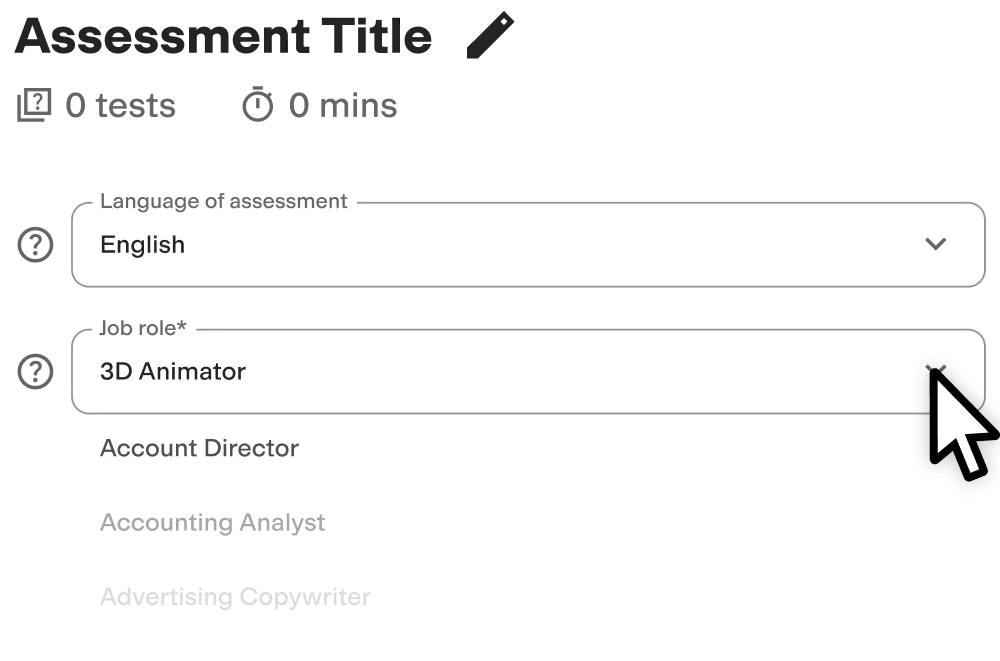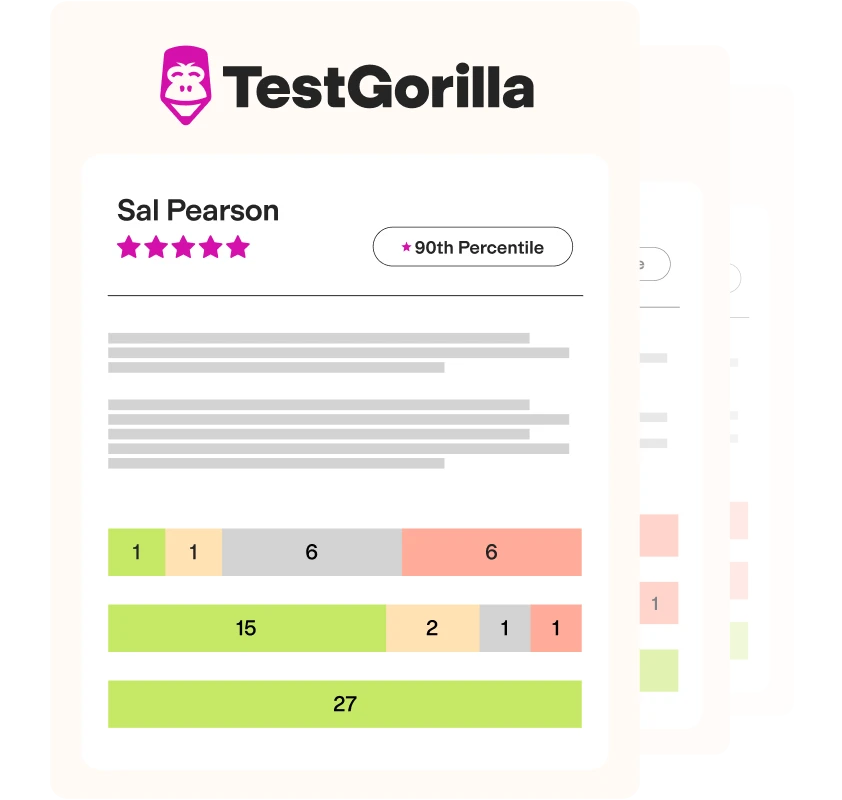Communication skills test
Summary of the Communication test
The Communication test assesses your candidates’ communication skills, ensuring they can understand others and express themselves clearly using professional etiquette. It evaluates written and verbal communication, as well as non-verbal cues and active listening.
Covered skills
Understanding and interpreting written communication
Listening actively and interpreting non-verbal cues
Interpreting, summarizing, and clarifying information
Using professional communication etiquette
Use the Communication test to hire
Any job role that requires strong communication skills, including sales representatives, customer service agents, administrative workers, managers, IT specialists, and many more.
You can use this test for free when you sign up for a Free forever plan.
About the Communication test
Effective communication is the foundation of healthy working relationships, including building strong teams and creating long-lasting client connections. Transparent communication builds trust, resolves and prevents problems, provides clarity and direction, improves productivity, and increases engagement.
Our communication assessment measures the following competencies:
Written: Evaluates how well a candidate conveys written information and interprets emails, instant messaging, and reports
Verbal: Gauges an applicant’s ability to express themselves through spoken words and understand the words and intentions of others (both in-person and virtually)
Non-verbal: Determines a candidate’s ability to leverage the right facial expressions, gestures, and body language to convey their message and intent without miscommunications
This business communication skills test also measures jobseekers’ ability to clarify next steps, summarize messages effectively, and use professional communication etiquette.
Our test gauges a wide variety of communication competencies – check out our preview multiple-choice questions to see the assessment action.
Candidates who perform well on communication skills tests listen attentively to others, communicate confidently, and offer empathy and feedback to their teammates.
The test is made by a subject-matter expert
Sarah E.
Storyteller, communication coach, author and professional musician, Sarah offers workshops and coaching packages that reduce miscommunication – the most common cause of tension in the workplace.
With nearly 20 years’ experience working in public sector agencies, Sarah has completed an MBA and achieved the StrengthsFinder certification, both of which she uses to improve professional environments and guide teams to communicate in a way that increases satisfaction and happiness at work and at home.
Crafted with expert knowledge
TestGorilla’s tests are created by subject matter experts. We assess potential subject-matter experts based on their knowledge, ability, and reputation. Before being published, each test is peer-reviewed by another expert, then calibrated using hundreds of test takers with relevant experience in the subject.
Our feedback mechanisms and unique algorithms allow our subject-matter experts to constantly improve their tests.
What our customers are saying
TestGorilla helps me to assess engineers rapidly. Creating assessments for different positions is easy due to pre-existing templates. You can create an assessment in less than 2 minutes. The interface is intuitive and it’s easy to visualize results per assessment.
VP of engineering, mid-market (51-1000 FTE)
Any tool can have functions—bells and whistles. Not every tool comes armed with staff passionate about making the user experience positive.
The TestGorilla team only offers useful insights to user challenges, they engage in conversation.
For instance, I recently asked a question about a Python test I intended to implement. Instead of receiving “oh, that test would work perfectly for your solution,” or, “at this time we’re thinking about implementing a solution that may or may not…” I received a direct and straightforward answer with additional thoughts to help shape the solution.
I hope that TestGorilla realizes the value proposition in their work is not only the platform but the type of support that’s provided.
For a bit of context—I am a diversity recruiter trying to create a platform that removes bias from the hiring process and encourages the discovery of new and unseen talent.
Chief Talent Connector, small business (50 or fewer FTE)
Use TestGorilla to hire the best faster, easier and bias-free
Our screening tests identify the best candidates and make your hiring decisions faster, easier, and bias-free.
Watch what TestGorilla can do for you
Create high-quality assessments, fast
Building assessments is a breeze with TestGorilla. Get started with these simple steps.
View a sample report
The Communication test will be included in a PDF report along with the other tests from your assessment. You can easily download and share this report with colleagues and candidates.
Why are communication skills important to employers?
Communication is an invaluable skill that contributes to an individual’s job success and impacts the productivity of the entire team. Successful communication affects how people share and interpret messages and ideas.
Good communication skills make the difference between:
Efficiency or delays
Clarity or confusion
Motivation or reluctance
Profits or losses
For example, a project manager who is about to deliver new client guidelines to their team realizes there’s a discrepancy in the information. They quickly contact the client to fix a vital error before delivering the guidelines and misinforming the team. This saves the next round of work.
When you test communication, you ensure your new hires possess these crucial skills, so they contribute to a productive workflow from day one.
Solid Solutions Management, a professional design software company, uses TestGorilla talent assessments to identify promising graduates, gauging communication styles, technical skills, and personality. The company believes communication is one of the most important competencies and a key factor in trainability, which is essential for rapidly changing software engineering roles.
This is why they use communication assessment tools to screen candidates – leading to Solid Solutions Management offering full-time positions to 95% of students hired with skills tests.
The 4 types of communications to examine
Communication is more than back-and-forth verbal dialogue. A thorough assessment of communication gauges four main areas:
Written: Written communication is increasingly common in the modern workplace and is one of the primary methods of sharing information. Keen writing skills help people convey the right meaning through emails, messaging, and articles they write and read.
Verbal: This refers to verbal and listening skills and how people interact using spoken words, both online and in person. Solid verbal communication helps employees clearly express themselves and speak with confidence and empathy.
Non-verbal: Non-verbal communication, also known as body language, is how people express their feelings and intentions (and pick up on those of others) through posture, eye contact, and facial expressions.
Visual: This refers to using graphs, videos, and designs in the workplace. Those who need to simplify information for others often use this type of communication to make information more digestible. Screen for this subskill by using our Attention to Detail (Visual) test in parallel with the Communication test.
What job roles can you hire with our Communication test?
A communication skills online test is the ideal way to screen applicants for any open role. Every position needs this competency on some level – some require continuous verbal communication, while others require only email correspondence.
For jobs that require advanced communication expertise, such as executives and HR directors, consider our Intermediate Communication test. This test gauges complex abilities like handling delicate cultural matters and dealing with urgent discussions.
Here are a handful of roles you can hire with our standard communication assessment test:
Sales representatives must communicate with prospects and clients to describe products and services and then relay crucial information to colleagues to manage clients’ expectations.
Customer service and support staff need to actively listen to customers and communicate product knowledge and solutions. When screening for these roles ensure they have the interpersonal communication skills to offer clear information.
Administrative assistants work cross-functionally, coordinating schedules and communication between various departments and teams.
Managers across every industry must relay constructive feedback to employees and stakeholders and communicate organizational news in an understandable way.
IT specialists often need to share technical information with team members, avoiding industry jargon and using layman's terms to help teammates and clients understand their meaning.
Communication skills assessment tests are a smart idea for any screening process, but your return on investment (ROI) is different depending on your hiring volume and company size. Measure the benefits of talent assessments instantly with our recruitment ROI calculator.
Create a multi-measure assessment: 4 tests to pair with the Communication test
Our communication skills test is a powerful tool for screening candidates but shouldn’t be used alone in your recruitment process. We recommend multi-measure assessments, which are a combination of tests that gauge several competencies, including hard and soft skills, personality, and culture.
This approach gives you a holistic evaluation of your applicants that resumes can’t match.
Try adding the communication skills test to this example multi-measure assessment:
Leadership & People Management test: Measure how an applicant supports and guides others. Combine it with our Communication test to measure a candidate’s ability to lead a team and motivate them toward success.
Negotiation test: Evaluate a jobseeker’s ability to control and drive a conversation and close valuable deals. Pair it with a communication skills test to find direct, convincing communicators who can help you close better business deals.
Business Judgment test: Measure a candidate's ability to strategize and make solid decisions. Pair it with the Communication test to discover people who can strategize accurately and win over stakeholders.
Big 5 (OCEAN) test: Assess an applicant’s behaviors and strengths. Personality tests, like the OCEAN assessment, enable you to find the right type of communicator for your role – like an extroverted sales rep.
Note: We haven’t included any role-specific skills tests here because they depend on the position you’re hiring for. However, we highly recommend you add at least one in your five-test assessment to ensure your candidates possess the right skills for the job.










